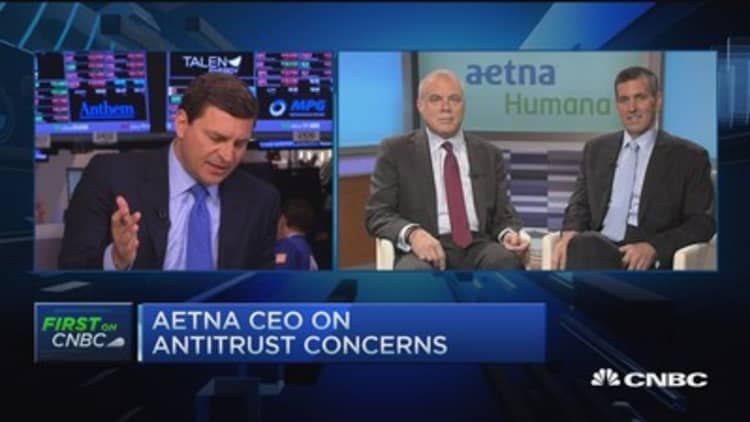The four major health insurers currently pushing for mergers — Aetna and Humana, and Anthem and Cigna — are still a long way from gaining federal approval. But they say they're optimistic their respective deals will close by year-end, in part because they have had success getting the nod from state regulators.
On Monday, Florida became the 10th state to approve Aetna's $34 billion takeover of Humana. The state's insurance regulators did not require any divestitures — in a state that is a major market for Humana's Medicare business — but as a condition of approval, the merged company will have to expand its Obamacare exchange coverage in the state.
Aetna said it was pleased with the decision, and that it now has half of the necessary state approvals it needs. Still, the company has cautioned investors that the Department of Justice could impose stricter requirements for federal approval.
"The DOJ conversations are not even yet started on the divestiture front," Aetna CEO Marc Bertolini said on the company's fourth quarter conference call earlier this month. "We're still sharing data and working on the framework of the discussions."
So far, Anthem's $54 billion acquisition of Cigna has been approved by four states — Alabama, Tennessee, Nevada and Montana — according to a company spokesperson. Twenty-two other states are still reviewing the deal, along with federal regulators.
"I would characterize things as proceeding just as we might have expected. But, keep in mind, we've got a long way to go," said Cigna CFO Thomas McCarthy during an appearance at the Leerink Health Care conference in New York last week.
According to a transcript of the session, McCarthy said he couldn't offer much insight into discussions with the DOJ.
"Our assessment of, 'gee, what's the body language? '… is a very unreliable predictor. So, it really wouldn't be helpful to share that," he said. "We're comfortable with the resources we've brought to bear to respond to the DOJ request."
Still, the deals are not yet a sure thing.
Critics of the deals have their say

Federal regulators have not made public comments about the process, but top regulators from the DOJ and the Federal Trade Commission have been called to testify in an antitrust hearing in the Senate. Regulators are working on a massive backlog of deals across many industries. The insurer merger agreements struck last summer came during a record year for M&A, with more than 100 mergers valued at over $4.5 trillion.
In the meantime, the DOJ has been talking to some of the insurers' biggest critics. Doctors and hospital groups have vigorously opposed the deals, arguing that consolidation among four of the nation's largest health insurers will put providers at a major disadvantage, by pushing their reimbursement rates too low.
"They were interested in the perspective of rank and file physicians," said Robert Doherty, senior vice president of government affairs with the American College of Physicians, who told DOJ regulators in a telephone interview recently that the combined insurance giants could drive primary care doctors and small physician practices out of business.
"They typically will not have the leverage to be able to say no to an insurance contract, when that insurer may control 50-60 percent of the patients they see," he said.
Trading below deal price
With the uncertainty over federal approval, Cigna and Humana shares are trading at a wide discount to their acquisition prices. Humana shares are trading at a 25 percent discount to the original deal price of $215 in cash and stock, while Cigna shares are 30 percent below Anthem's original offer of $188 in cash and stock.
The wide spread is due in part to the market pullback but also because investors are worried the mergers could be blocked, or approved with wide divestitures.
"There's only so much money out there in the hands of merger arbitrageurs and event-driven investors that can soak up the supply of these stocks, and keep the spreads within a tight range," said Roy Behren, an arbitrage fund manager at Westchester Capital Management. "The fact that these are so large would help keep the spreads wide and relatively inefficiently priced."
Political uncertainty
Investors may also be wary about how concerns over consumer choice and insurance costs could shape the regulatory review, at a time when the issue of high-cost drugs have helped make health-care competition a major campaign issue.
"We'll see a lot of scrutiny on the federal and state level, especially because this an election year," said Trine Tsouderos, director of PwC's Health Research Institute. "There's a certain amount of politicization of these deals."
But beyond the politics, the Obama administration is under pressure to render a decision before the end of the year, which doesn't leave much time if the administration decides to challenge the deals.
"These are complicated mergers as a factual matter, and the staff has to complete two intensive investigations and formulate recommendations, while leaving a lot of time for its leadership to make a decision," said Mark Botti, co-head of global antitrust at Squire Patton Boggs.
If the process is not resolved before time runs out on the Obama administration, Botti says it could prolong the uncertainty well into next year.
"If there's a change in the leadership in the division, even if they're of the same party … it causes all sorts of delay in decision-making, as the new leadership gets up to speed and puts its own slant on each case," he said.
CORRECTION: An earlier version of this story misstated the firm of fund manager Roy Behren. He is with Westchester Capital Management.




